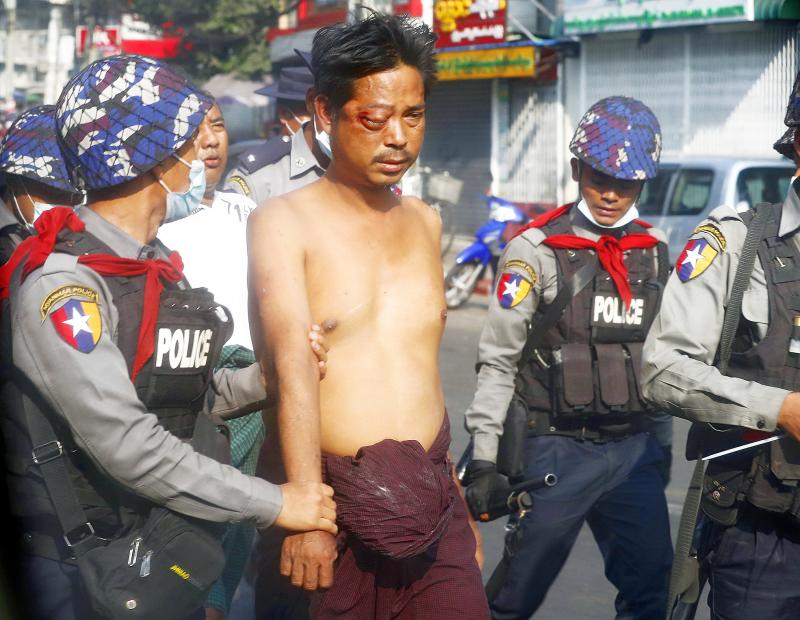Riot police in Myanmar yesterday dispersed hundreds of protesters who have rallied daily in the country’s largest city against a military junta that toppled civilian leader Aung San Suu Kyi.
In some cities, security forces have steadily increased their use of force, but in Yangon, authorities have exercised restraint, largely relying on barricades and troop presence to prevent gatherings around city landmarks and embassies.
Protesters have bypassed restrictions by moving fluidly through the city, organizing around central junctions Hledan and Myaynigone.

Photo: EPA-EFE
However, riot police yesterday advanced on the demonstrators, who were mostly sitting and chanting pro-democracy slogans, and warned them to disperse.
At least two people were arrested after officers cleared the busy traffic artery.
One was Yuki Kitazumi, a Japanese freelance reporter.
“According to eyewitnesses, he was beaten on the head by a baton, but he was wearing a helmet,” Kitazumi’s assistant, Linn Nyan Htun, wrote on Facebook, adding that he had reached out to the Japanese embassy.
A police officer denied that Kitazumi was beaten, but confirmed that the journalist had been detained at a local police station and would be released after giving a statement.
On a smaller residential street off Myaynigone, some demonstrators assembled makeshift barricades, using barbed wire and stacked tables to halt police.
Wearing hard hats, protesters shouted the regular anti-junta refrain: “Failure to the dictatorship is our cause, our cause.”
Uptown off Hledan junction, demonstrators sprinted away as police warned: “If people do not disperse, we will have to disperse by force.”
Protester Nyo Hlaing ran into a nearby house to hide, telling reporters that police had deployed stun grenades.
“We had to run,” Nyo Hlaing said, adding that some protesters retaliated by shooting projectiles using slingshots at the police.
Reporters on the ground heard several stun grenades detonate and saw police arrest more people.
As police searched some apartments, residents around Hledan protested by banging pots and pans.
Back on the main traffic junction, officers allowed buses and other vehicles to pass.
Some passengers flashed a three-finger salute — a symbol of resistance borrowed from Thailand’s pro-democracy movement.
Meanwhile, the World Bank halted payments to projects in the country, while Facebook banned the military.
The bank has halted the payments on withdrawal requests that were made after the coup, the bank said in a letter to the Burmese Ministry of Finance.
World Bank president David Malpass last week said that it was taking an “extra cautious” approach to Myanmar, but was continuing to execute past projects, including emergency COVID-19 relief.
Facebook said that due to the “deadly violence” since the coup, it had banned the Burmese military from using its platforms.
Additional reporting by Reuters

CHAMPIONS: President Lai congratulated the players’ outstanding performance, cheering them for marking a new milestone in the nation’s baseball history Taiwan on Sunday won their first Little League Baseball World Series (LLBWS) title in 29 years, as Taipei’s Dong Yuan Elementary School defeated a team from Las Vegas 7-0 in the championship game in South Williamsport, Pennsylvania. It was Taiwan’s first championship in the annual tournament since 1996, ending a nearly three-decade drought. “It has been a very long time ... and we finally made it,” Taiwan manager Lai Min-nan (賴敏男) said after the game. Lai said he last managed a Dong Yuan team in at the South Williamsport in 2015, when they were eliminated after four games. “There is

Chinese Nationalist Party (KMT) lawmakers have declared they survived recall votes to remove them from office today, although official results are still pending as the vote counting continues. Although final tallies from the Central Election Commission (CEC) are still pending, preliminary results indicate that the recall campaigns against all seven KMT lawmakers have fallen short. As of 6:10 pm, Taichung Legislators Yen Kuan-heng (顏寬恒) and Yang Chiung-ying (楊瓊瓔), Hsinchu County Legislator Lin Szu-ming (林思銘), Nantou County Legislator Ma Wen-chun (馬文君) and New Taipei City Legislator Lo Ming-tsai (羅明才) had all announced they

Nvidia Corp CEO Jensen Huang (黃仁勳) yesterday visited Taiwan Semiconductor Manufacturing Co (TSMC, 台積電), as the chipmaker prepares for volume production of Nvidia’s next-generation artificial intelligence (AI) chips. It was Huang’s third trip to Taiwan this year, indicating that Nvidia’s supply chain is deeply connected to Taiwan. Its partners also include packager Siliconware Precision Industries Co (矽品精密) and server makers Hon Hai Precision Industry Co (鴻海精密) and Quanta Computer Inc (廣達). “My main purpose is to visit TSMC,” Huang said yesterday. “As you know, we have next-generation architecture called Rubin. Rubin is very advanced. We have now taped out six brand new

POWER PLANT POLL: The TPP said the number of ‘yes’ votes showed that the energy policy should be corrected, and the KMT said the result was a win for the people’s voice The government does not rule out advanced nuclear energy generation if it meets the government’s three prerequisites, President William Lai (賴清德) said last night after the number of votes in favor of restarting a nuclear power plant outnumbered the “no” votes in a referendum yesterday. The referendum failed to pass, despite getting more “yes” votes, as the Referendum Act (公民投票法) states that the vote would only pass if the votes in favor account for more than one-fourth of the total number of eligible voters and outnumber the opposing votes. Yesterday’s referendum question was: “Do you agree that the Ma-anshan Nuclear Power Plant